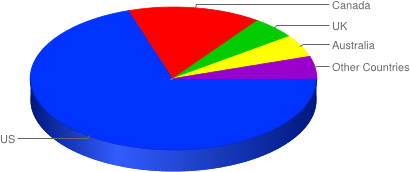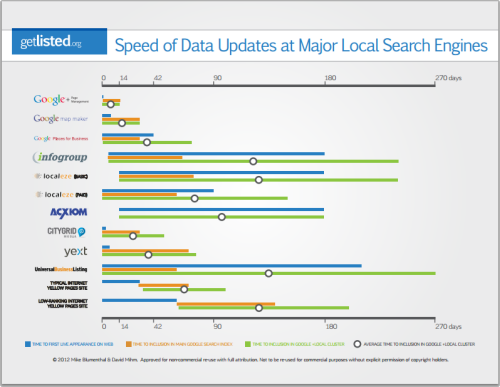 Some local-search pros are narrow. They’ve only helped business owners in one industry, or in one country. Or maybe in a couple.
Some local-search pros are narrow. They’ve only helped business owners in one industry, or in one country. Or maybe in a couple.
Then there are the adventurous ones, with all kinds of experience.
You won’t find a better representative of the second group than Nyagoslav Zhekov, of NGSMarketing.
Originally from Bulgaria, he learned the ropes of local SEO while studying abroad in Japan, and now he lives in Johor Bahru, Malaysia.
You might even call him an “International Man of Mystery.”

I’ve gotten to know Nyagoslav over the past couple of years. I look forward to the useful posts on his blog (one of my favorites), and to the occasional phone pow-wow. We’ve also worked together on several projects.
And I’ve concluded that when local rankings go to sleep at night, they check under the bed for Nyagoslav.
One reason is he lives and breathes local search. He’s a spoken at SMX West, is a Top Contributor at the Google and Your Business help forum, and contributes to the Local Search Ranking Factors survey – to name a few points.
But probably his biggest asset is he’s helped business owners in more countries than most people could find on a world map. When you do that, you learn a lot about how to get a business visible on the “local map” in all sorts of situations.
So, I interviewed Nyagoslav about “international” local SEO. What I wanted to know is: how does the process of getting visible in the local rankings differ from country to country, and what’s always the same?
If you want to know more about how to get a business visible locally – wherever “local” may be – read on.
—
Phil: Let’s start off with some quick facts. You’ve worked with business owners in how many different countries so far?
Nyagoslav: I just had to count and the answer appears to be 18 (UK, Ireland, France, Germany, Holland, Spain, Sweden, Romania, Bulgaria, United Arab Emirates, Japan, Malaysia, Singapore, Australia, New Zealand, USA, Canada, Mexico).
Phil: What’s the breakdown of those clients? Put another way: if we did a pie-chart of the countries they’re from, roughly what would it look like?
Nyagoslav: I would say about 70% are from the US, about 15% from Canada, 5% from the UK, 5% from Australia, and the other 5% (about 2-3 clients per country) are for the rest.

Phil: Where were your very first clients from?
Nyagoslav: Interestingly (or not), my first client was from Australia, the second one was from New Zealand, and the third one – from the UK. I still remember very clearly both the specifics of each of these cases, and how each of them got in touch with me.
Phil: What’s the hardest part of doing local SEO for businesses in all these different places?
Nyagoslav: I would say my biggest struggle has always been the language barrier. It is very difficult to outsource or seek help from someone who is fluent in the particular language, because they are usually not aware of the SEO aspects of the equation. I do speak/read German fairly fine, for example, but my knowledge in other languages I had to work with, such as French, Swedish, or Spanish, is at beginner level.
Phil: How does citation-building differ (aside from the obvious difference in terms of which directories operate in which countries)?
Nyagoslav: There are two main differences (besides what you mentioned):
1) There are generally lesser numbers of potential “structured” or “traditional” citation sources in many of the countries I mentioned above, as compared with the US. For instance, in New Zealand there are not more than 10-15 business directories that allow free listings. In such cases one usually needs to look for alternative solutions. Some great suggestions on finding and using alternative citation sources are given here, here, here, and here.
2) The time for citations to work greatly varies. While for the US, a top tier citation, such as one coming from a trusted data provider, might take not more than a couple of weeks to do its job, in many other cases it takes months for citations to work. I have been observing decrease in this buffer period recently, but it is still significantly longer elsewhere than it is for the US.
(Click to enlarge. Courtesy of David Mihm and Mike Blumenthal.)
Phil: Local SEO tools: which ones work particularly well in some countries but not as well in others? How does your “toolkit” change from country to country?
Nyagoslav: Unfortunately, very few tools work in countries other than the “usual suspects.” Most of the tools are being created in the English-speaking world, and thus serve mostly English-speaking users. Bright Local’s toolkit works only in the US, Canada, the UK, and Australia, for instance. GetListed used to work in Canada and the UK, besides the US, but now even the former two were cut. Yext also works only for American businesses. Tools, such as Link Prospector of Citation Labs for instance, are optimized to work for queries in English, although they could theoretically work for other languages, too. I always give the example with a query I ran on the Link Prospector for “boot Amsterdam”, which means “boat Amsterdam” in Dutch, and is one of the most competitive keywords in the local market. While the tool returned a number of relevant results, there were also a significant amount of references to shoe shops in Amsterdam. Reputation management software is also rarely available outside the US.
These are the main reasons for me to do most of the work manually, and to rely heavily on Webmaster Tools, Analytics, and Screaming Frog for my general SEO purposes, and on Whitespark’s Local Citation Finder for discovering potential citations. However, I acknowledge that some very big markets, such as the German- and Spanish-language ones, are wide open in terms of local SEO software development.
Phil: Do you find that Google’s enforcement of its quality guidelines differs at all? Have you encountered “Wild West” situations in any country?
Nyagoslav: Yes, there are many places where Google’s rules are hardly ever being enforced. I believe the case of Dubai is interesting, as there almost every business uses P.O. boxes as their business address. Obviously, this is a big no-no for Google, but up until recently, Google had never penalized anyone for this. I can see a trend of Google getting stricter on more fronts, though.
Phil: What are some sites that a business owner in any country should pay attention to? (For instance, I know pretty much every country has a version of YellowPages, Yelp is expanding, and businesses anywhere can and should have a Facebook page.)
Nyagoslav: While I am not too interested in the business side of the problem, I do know that the Yellow Pages ownership in almost every country is different, although the products offered are similar. You are correct that these sites are one of the major places a business owner should pay attention to.
A very notable example is Yellow Pages Canada, which is the de facto leader in the business listings data niche in Canada. They are the main data provider for Google and Yahoo in the country. Another example is Yellow Pages Australia, part of the Sensis product basket. I would say they are even more influential than their counterparts in Canada.
In general, every country has a main business listings provider, branded Yellow Pages or not, and these still play very significant role in the small business online (and offline) marketing field, although in the US their importance deteriorates.
Yelp currently has presence in 20 countries, and in many of these they are virtually unknown, so I wouldn’t say they are as internationally important. There are very few “generic” business websites that cover significant number of countries. Some of the notable ones might be HotFrog (38 countries), Manta (every country in the world, but user-generated listings are available only in a few), Brownbook (every country), Cylex (30 countries), Factual (50 countries), Locationary (more than 100 countries), Acxiom, and others. I would suggest paying closer attention to Nokia’s Here as it is the data provider for Bing’s local listings in many markets.
[By the way, Nyagoslav did a great series of posts on international local citations a while ago.]
Phil: I’m assuming that you’re often asked to optimize sites that aren’t in languages you speak or read. Tell me a little bit about how you handle those sites.
Nyagoslav: Indeed. I usually try to work as closely as possible with the clients in such cases. In some situations I try to use my “internal” resources, too. For instance, one of my employees has fair knowledge in Arabic. My brother is fluent in French, and I have a friend with good understanding of SEO, who is almost bilingual in Spanish. I use this tactic, because I am generally not a big fan of outsourcing and try to do practically everything in-house.
Phil: In my experience, people outside the US aren’t quite as likely to leave reviews for businesses. Based on your experience, how true is that?
Nyagoslav: I don’t think this is entirely true for the biggest part of the world. There are, of course, countries where people are generally more conservative in regards with leaving reviews or providing testimonials, mostly because of privacy or legal concerns. However, I believe the biggest problem is unawareness, rather than unwillingness.
Phil: So for your “international” clients how do you approach the task of getting reviews from customers?
Nyagoslav: I do use a lot of your ideas and your approach, but it really depends on the type of business, because not all strategies are universal. One sad fact is that many automated tools do not serve non-US businesses.
Phil: What have you learned about doing local SEO for business owners all over the globe that has helped you do it for US business owners?
Nyagoslav: I don’t really make any significant difference between my US clients and their cases, and my non-US clients. I mean, speaking literally, the US is also considered “international” in my case.
Phil: As you’ve helped business owners in more and more countries, have you gotten a better sense of the local-rankings fundamentals that matter everywhere?
Nyagoslav: This I can answer positively. Although the majority of my experience is with US companies, it is good to know ranking factors are not very different from country to country. The main difference is probably the time it takes for Google to update their indices, i.e. the time between you, as an SEO, setting up the “hooks” and Google recognizing them and taking them into account. Another periodically encountered group of differences is the one related to Google’s general algorithm updates that are being rolled out non-simultaneously across the world.
Phil: What are you trying to get better at – when working with “international” clients, specifically?
Nyagoslav: I do not differentiate between US, UK, Dubai, or Singaporean clients. I always try to get better at every aspect of local SEO with every client and every case is an equally exciting challenge to me. What I am always trying to get better at, with every client, is conversion optimization and tracking.
Phil: Let’s talk about the demand for local SEO in various countries. Do business owners know they need more online local visibility but aren’t sure how to find someone who can help? Or do they know the types of people to search for (like you) but want someone who’s based in the same country?
Nyagoslav: Outside the English speaking world SEO (in general) is not as well-known, so usually awareness is what is missing. I’ve been having a lot of conversations on this topic with Ken Fagan, who targets France and the Francophone part of the world. Even in a country like France, you have to be very proactive in order to find businesses willing to spend money on local SEO. In fact, you should first start from explaining what SEO is, and then moving to demonstrating its advantages and how it could help a small business. It is definitely challenging.
Phil: Outside of North America, the UK, continental Europe, Australia, and New Zealand, how much demand would you say there is for local SEO?
Nyagoslav: The demand is low and it is mostly in the travel and entertainment industry. There is some interest from businesses in developed countries other than the ones you mentioned, such as Singapore, Japan, UAE, some cities in South America, RSA, but the demand is insignificantly low compared to in the regions you listed above.
Phil: Have you noticed any “typical” profiles of business owners who contact you from one country versus another? For example, can you say that most of the people who contact you from continental Europe are doctors or lawyers, or run bricks-and-mortars stores, etc.?
Nyagoslav: Now that you mention it, there are indeed some differences. For instance, the legal industry in the US is very active in terms of online advertising, whereas in Europe and other parts of the world this is not really the case. Service-based businesses are active everywhere. The photography industry is extremely competitive in the UK. The countries from the British Commonwealth have some unique types of businesses that are not typical for other parts of the world.
Phil: When you work with a business owner in a country you’ve never dealt with before, to what extent is there a learning curve for you?
Nyagoslav: Learning is always there every time you work in a new niche. For me, the most interesting part of SEO, which is always unique, is to discover the typical profile of the local (country-level “local”) websites where one could get active on, interact with, or get a link/citation from. Everything outside the business’s own web properties (website, Google+ Local listing, Facebook page) is different everywhere, not just inter-country, but within the countries themselves, too.
Phil: Here in the US, as you know, we local-search geeks talk about how business owners need to educate themselves at least a little bit about what different types of search-marketing can and cannot do for them, what steps we can do for them versus what steps take a team effort, etc. Are the “awareness” issues generally the same in other countries?
Nyagoslav: I’d say usually the awareness issues are at a lower level outside the US. One has to first start by explaining what online marketing in general and SEO in particular are, and then move to how they could aid to business’s overall marketing efforts. Just after these bases are covered, one could move on to discussing issues such as the ones you described.
Phil: Are there any countries that seem to have a lot of good local SEOs who aren’t really known in English-speaking countries?
Nyagoslav: I rarely interact with SEOs in other countries, but according to my observations, the local SEO industry in Germany is relatively well-established. There are a number of Spanish-speaking local SEOs, too. I already mentioned that this is not the case in the French-speaking world.
Phil: What do you like most about working with clients all over the globe?
Nyagoslav: I generally enjoy communicating with people from different cultures. Some cultures are, of course, easier to assimilate and understand than others. I originate from a country where ethnic diversity is not that common, so probably this enhances the interest somehow.
Phil: Would you say it’s a personal goal of yours to work with clients in as many countries as possible?
Nyagoslav: I wouldn’t say so. I don’t have such a goal set, but I must admit, I always feel rather more excited when someone from a Caribbean country contacts me, as compared to someone from North Attleboro, MA, for instance (countries and cities chosen entirely randomly).
[I’d be pretty steamed if someone from home sweet home North Attleboro contacted Nyagoslav for local SEO help!]
Phil: What are some trends you predict? For example, do you envision more business owners looking outside their country for good, ethical local SEOs?
Nyagoslav: With the growth of the SEO industry internationally, more and more high-quality providers will also occur. In this sense, it is very possible that a trend of businesses hiring SEOs out of their country might appear. However, my current observations are that businesses, especially the ones that haven’t had any prior experience with or knowledge in SEO, prefer to hire someone as nearby to them as possible.
Phil: Are there any people from whom you learned a lot about “international” local SEO – especially early on?
Nyagoslav: Early on, I learned pretty much anything I know about local SEO from reading the answers of Top Contributors in the Google Places Forum, as well as from the blogs of Mike Blumenthal, David Mihm, Matt McGee, and Miriam Ellis. I didn’t really learn, especially early on, much about international local SEO from anyone, it was (and is) mostly based on personal experience. There are very few materials that cover the topic anyway.
Phil: Let’s say I’m a local SEO who’s only worked with clients in my country but I want to work with more clients from all over the place. What are the biggest hurdles, and what advice do you have?
Nyagoslav: Purely SEO-wise, the biggest obstacle is the potential lack of knowledge of the local terminology. I recently had the opportunity to work with a “conveyancer” from Australia. A conveyancer is “a specialist lawyer who specializes in the legal aspects of buying and selling real property, or conveyancing.” The SEO that worked on the case before me mistook this business for a real estate agency. Soon after, Google started thinking they indeed were a real estate agency and “ranked” them for related terms. Another issue is the potential lack of knowledge of the local target audience, the way they search, and the type of content they like to see/read.
My advice would be for local SEOs to think very carefully before taking on such challenges. It will most probably require much more effort and research work than they would have to do for a known market or niche.
Phil: Anything you’d really like to mention that we haven’t covered?
Nyagoslav: Did I mention Phil is one of the best and most trustworthy local SEOs I’ve ever had the chance to know? 🙂
[You’re way too kind, but I’ll take it.]
—
Any questions for Nyagoslav or for me? Observations about local SEO in whatever country? Leave a comment!
P.S. This is exactly the 100th post I’ve done on this blog since starting it two years ago. I can’t think of a better #100.

Congrats Phil on #100
Fascinating piece
If I’m asked “who are the world renowned local SEO’s?” my answer would be Nyagoslav and Phil, of course
Thanks a bunch, Chris. However, I am no “International Man of Mystery” 🙂
+1 to everything Phil said 😀
Phil, Nyagoslav:
Great interview. Very enlightening. I already referred it to someone.
(so it turned into a mutual admiration society love-fest at the end!!! 😀 ) that is okay. Its still an informative article and helpful
Thanks, Dave!